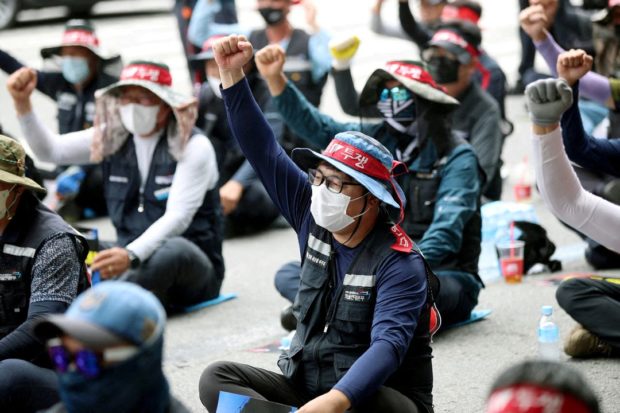South Korea truckers return to work after strike ends; shares rally

Members of the Cargo Truckers Solidarity union take part in a protest in front of Kia Motor’s factory tin Gwangju, South Korea, June 10, 2022. Yonhap via REUTERS
SEOUL — South Korea’s unionized truckers headed back on the roads on Wednesday after the union and the transport ministry reached a tentative late-night agreement, ending a nationwide strike that crippled ports and industrial hubs.
The transport ministry and truckers union agreed on late Tuesday to extend the truckers’ minimum wage system and continue discussing expanding a guarantee of minimum pay for carrying cargo to cover additional products. The transport ministry will also review expanding fuel subsidies.
Shares in some affected industries rose in early trade, after the eight-day strike had delayed cargo shipments from autos to cement and alcohol, costing South Korea more than $1.2 billion in lost output and unfilled deliveries.
“So the strike has been called off until our demands are passed in parliament,” said Park Jung-hoon, an official at the union’s Busan chapter, referring to the process the transport ministry must undertake to implement the agreement.
“In the next two to three days, 100% of unionised truckers at Busan port are expected to return to work after they get some rest. There might be some shippers who seek retributions, and in such cases, we will respond strongly.”
Article continues after this advertisementThe strike had been an early test of the new government of President Yoon Suk-yeol and had further stretched global supply chains already disrupted by China’s COVID-19 curbs and Russia’s invasion of Ukraine.
Article continues after this advertisementShares in Hyundai Motor (005380.KS) rose 4% while shares in Hanil Cement (300720.KS) rose as much as 7% in early trade.
“Production has been normalised at our Ulsan Plant and we will continue to minimise customer inconvenience from the production disruption,” Hyundai Motor said in a statement to Reuters on Wednesday.
Yoo Ji-woong, an analyst at Daol Securities estimated the strike had impacted about 5,000 vehicles each for both Hyundai and Kia (000270.KS) but said there were sufficient opportunities to make up for lost production during June through overtime.
Steelmaker POSCO, a unit of POSCO Holdings (005490.KS), halted work at some plants on Monday due to a lack of space to store unshipped products, but plans to achieve originally planned production output by adjusting its maintenance, a spokesperson said.
“We plan to resume our overland transport of steel products out of Pohang and Gwangyang steel plants starting 1 p.m. (0400 GMT) on Wednesday,” the spokesperson added.
Korea Zinc (010130.KS) said its shipments of sulfuric acid, a key raw material of semiconductors, are back on track after strikers retreated from its production base in Ulsan.
An official at SK Plasma, which manufactures medicines with plasma, said its shipments of plasma supplies, which had been trapped in Busan port, partially resumed on Wednesday.
RELATED STORIES
South Korean health workers drop strike plans after agreement
South Korea, Philippines strike free trade deal
South Korea in eleventh-hour talks to head off strike by health workers